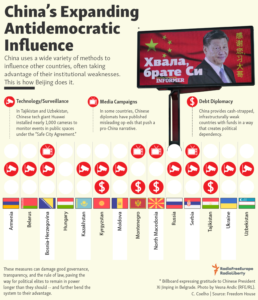What role does ideology play within the Chinese Communist Party (CCP)? @CSISFreeman is releasing a series of previously untranslated documents and speeches from within the Chinese Communist Party to better answer this question: https://t.co/S8SHJ5LxLG
— CSIS (@CSIS) August 14, 2020
In the growing ideological rivalry with China, the United States cannot rely on the threat of communist revolution to drive social and economic elites around the world into alliance with America, because of course China is not threatening any such thing, argues analyst Anatol Lieven.
Unlike the Cold War with the USSR, the contest with China is not one to preserve the free market or religion from bloodstained fanatical revolutionaries: it hinges on the comparative success of two capitalist systems in economic development, the distribution of benefits for the good of society as a whole, social tranquility, and freedoms guaranteed against both state oppression and mass collective hysteria. In this rivalry, the maintenance of international respect for the U.S. political and economic model will be absolutely critical, he writes for The National Interest.

RFE/RL
Why is China becoming increasingly assertive now? Council on Foreign Relations president Richard Haass asks in Project Syndicate:
- It could be that President Xi Jinping sees an opportunity to advance Chinese interests while the US is preoccupied with the fallout of COVID-19.
- Or it could be an outgrowth of China’s desire to distract domestic attention from its initial mishandling of the virus and the economic slowdown exacerbated by the pandemic. This would not be the first time a government turned to nationalism to change the political conversation.
- A third explanation is the most worrisome. In this interpretation, China’s recent behavior is not so much opportunistic or cynical as representative of a new era of Chinese foreign policy, one that reflects the country’s growing strength and ambitions. If this is the case, it reinforces the view that a cold war or worse could materialize.
In contrast to Beijing’s external messaging—which emphasizes peace and cooperation with the United States—internal discourse is imbued with a much darker view of China’s relationship with the outside world, writes Jude Blanchette (above), the Freeman Chair in China Studies at the Center for Strategic and International Studies in Washington, D.C.
At least judging by an essay written by Huang Xianghuai, a senior researcher at the CCP Central Party School, a key institution for developing and disseminating new ideological and political guidelines. In the article, which focuses on the Party’s “ideological work” to build and maintain a coherence of values and beliefs within its ranks in order to strengthen organizational integrity, Huang expounds with great directness the key messages the Party leadership aims to disseminate amongst lower-level cadres and government officials.







